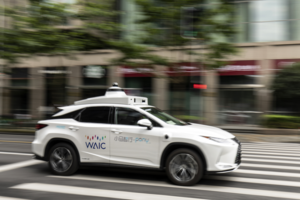Robotaxi Operator Pony.ai Opts for Nasdaq as it Files for U.S. Listing
Listen to the full version

Pony.ai Inc., the Chinese autonomous driving company, has filed for an initial public offering (IPO) on the Nasdaq, as the eight-year-old firm reports reduced losses.
The company did not disclose the size or price range of its planned offering in its filing with the U.S. Securities and Exchange Commission.
In April, it received approval from China’s securities regulator for a U.S. listing, with plans to sell up to 98 million shares and list on either the Nasdaq or the New York Stock Exchange, according to a statement on the China Securities Regulatory Commission’s website.

Unlock exclusive discounts with a Caixin group subscription — ideal for teams and organizations.
Subscribe to both Caixin Global and The Wall Street Journal — for the price of one.
- DIGEST HUB
- Pony.ai Inc., a Chinese autonomous driving company, plans to go public on Nasdaq but has not disclosed IPO details yet. It previously received approval to sell up to 98 million shares and has underwriters like Goldman Sachs and Bank of America.
- The company, valued at $8.5 billion, reported narrowing losses with revenues of $71.9 million in 2023. Its services include robotaxis and autonomous trucks, generating most of its revenue from the latter.
- High R&D costs contribute to their losses, but they aim to scale up by partnering with automakers and expect mass production by 2025, seeking a sustainable commercial model.
- Pony.ai Inc.
- Pony.ai Inc. is a Chinese autonomous driving company planning a Nasdaq IPO. Founded in 2016, it operates self-driving fleets in the U.S. and China and is valued at $8.5 billion. Despite no profits yet, revenues rose to $71.9 million in 2023, with losses decreasing. Major backers include Toyota and Saudi Arabia's Neom Co. Their focus is on scaling autonomous taxis with partners like Toyota, targeting mass production by 2025.
- Goldman Sachs
- Goldman Sachs is one of the underwriters for Pony.ai's planned IPO. It is involved in the process of helping to manage the initial public offering on the Nasdaq, providing financial and market expertise to facilitate the listing.
- Bank of America Corp.
- Bank of America Corp. is one of the underwriters for Pony.ai's IPO. The company is involved in helping Pony.ai with its initial public offering on the Nasdaq, working alongside other financial institutions like Goldman Sachs and Deutsche Bank AG.
- Deutsche Bank AG
- Deutsche Bank AG is one of the underwriters for Pony.ai Inc.'s upcoming IPO on Nasdaq. As a major global financial services provider, Deutsche Bank is playing a crucial role in facilitating this IPO by helping to sell shares and manage the process, alongside other financial institutions like Goldman Sachs, Bank of America, and others.
- Huatai Securities Co. Ltd.
- Huatai Securities Co. Ltd. is one of the underwriters for Pony.ai's IPO. As a financial services company based in China, it provides brokerage, investment banking, and asset management services. Huatai's involvement in the IPO indicates its role in facilitating the listing process and managing the sale of shares.
- Tiger Brokers Co.
- Tiger Brokers Co. is one of the underwriters for Pony.ai's IPO.
- 5Y Capital
- 5Y Capital is mentioned in the article as one of the early backers of Pony.ai, a Chinese autonomous driving company. Pony.ai has raised over $1 billion since its establishment, with 5Y Capital being part of the funding rounds that supported the company's growth and development.
- Toyota Motor Corp.
- Toyota Motor Corp. is a significant supporter of Pony.ai, having invested $400 million in 2020. Before Pony.ai's planned IPO, Toyota was the second-largest shareholder with a 13.4% stake. The partnership aims to scale up autonomous taxi production, with Pony.ai planning mass production by 2025.
- Saudi Arabia’s Neom Co.
- Saudi Arabia's Neom Co. is one of the supporters of Pony.ai, having invested in the company. Neom is part of Saudi Arabia's vision for a futuristic city that integrates cutting-edge technologies and innovations, aligning with its broader Vision 2030 strategy to diversify the economy.
- PODCAST
- MOST POPULAR






